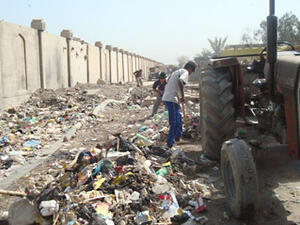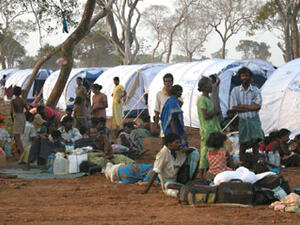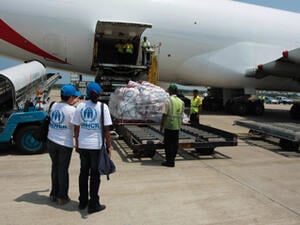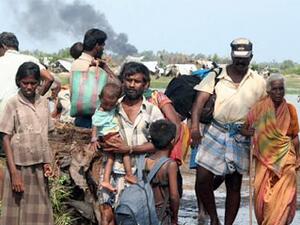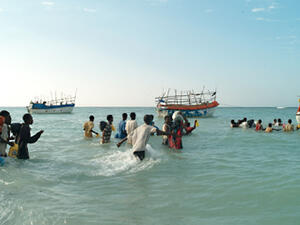Refugee situation in Chad precarious, but no return possible without security, says UNHCR
Refugee situation in Chad precarious, but no return possible without security, says UNHCR
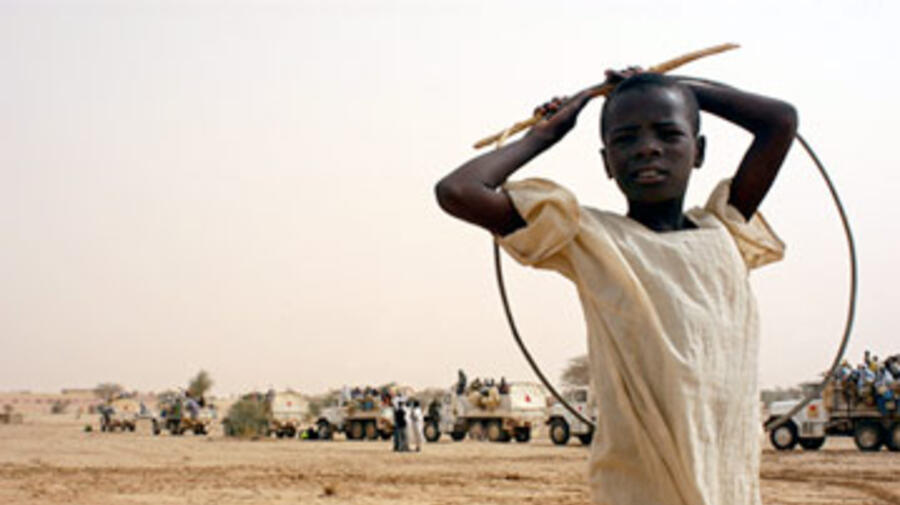
The harsh terrain in eastern Chad makes it hard to sustain a large Sudanese refugee population. In the background are refugees being moved from Bahai to Oure Cassoni camp in July.
GENEVA, Aug 27 (UNHCR) - The UN refugee agency's head of operations for the Sudan situation, Jean-Marie Fakhouri, has said that while the refugee situation in Chad is precarious, no return is possible in Sudan until security improves.
"The situation in Chad has improved in terms of the assistance in the camps, but it is extremely fragile and precarious," said Fakhouri. "We have our heads above the water, but all that is needed would be a breakdown in the food pipeline, or an epidemic, or overcrowding to actually have a catastrophe in Chad."
Fakhouri made the remarks at a press briefing in Geneva on Friday, following a three-week trip to the strife-torn Darfur region of western Sudan and the refugee-hosting area in neighbouring Chad.
In the face of this fragile situation, there is still a risk that more refugees could flee to Chad.
Fakhouri pointed to a group of 30,000 internally displaced persons (IDPs) in the Darfur village of Masteri who recently told UNHCR that they plan to flee to Chad if security does not improve. The displaced people at Masteri reported to Fakhouri and UNHCR staff that they are virtually trapped in the village and recounted incidents of killings and rapes whenever people ventured out. Fakhouri noted that the government of Sudan has taken the situation seriously, travelling with UNHCR to visit the village and meet with IDPs, and that the authorities have promised to increase security around Masteri.
While this group has not yet fled across the border, Fakhouri noted that there are people who are still considering leaving for Chad because security is not yet restored. "Masteri is but one dot on that border and there are many other dots of that nature," he cautioned.
He also stressed that even without additional influxes of refugees into Chad, the refugee situation is not sustainable over the long term. He noted the "atrocious, difficult conditions" in Chad and said the refugee operation there is "the most expensive one UNHCR is managing because of the terrain and the fact that there is absolutely nothing there."
Getting funding for such an expensive operation for the long term is worrisome. "My concern is what will happen when the attention of the international community shifts somewhere else," said Fakhouri.
Despite the constraints in eastern Chad, he noted that return to Sudan does not appear to be an immediate prospect. "Whether return is something that can happen today or tomorrow," Fakhouri said, "frankly, I doubt it. The situation on the ground does not lend itself to this."
The security situation will need improvement before any plans or thinking about return can be translated into reality on the ground.
"The IDPs in Darfur and the refugees in Chad have basically one major demand," said Fakhouri. "They want safety. They want security."
Nonetheless, he said, it is important to already begin thinking about and planning for the return of refugees and displaced people. Without a longer-term view, he warned, "In a sense, by not fighting to find a solution to this problem, we could be contributing to the fact that this is going to become fixed. People are going to remain in camps and remain in slums around the cities in Darfur."
He noted that the African Union-sponsored discussions in Abuja, Nigeria, are key to the resolution of the situation, with a political settlement needed for return to be possible. "As always there is a time lag between an agreement - if it happens at all - and actual changes on the ground," Fakhouri emphasised, "so I hope this will happen as early as possible."



